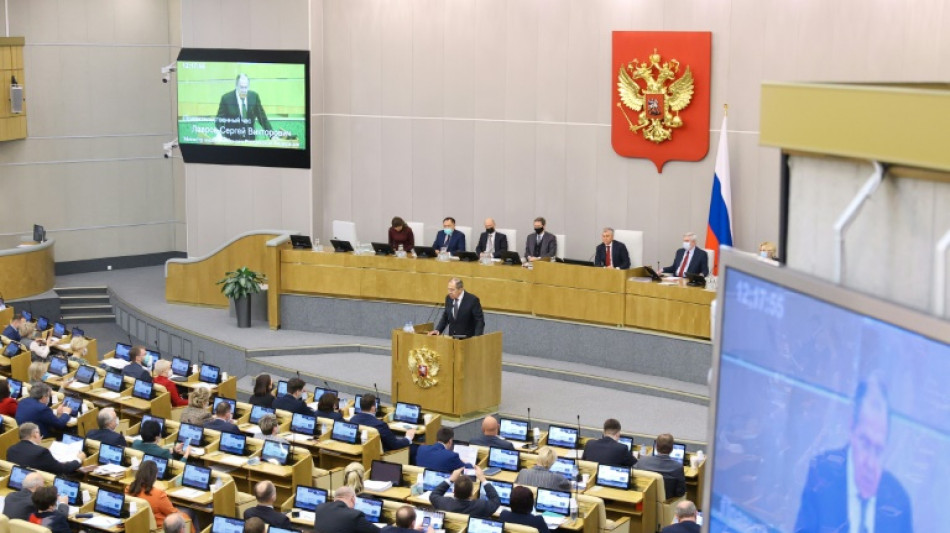

Russian parliament's call for east Ukraine independence sparks alarm
Possible Russian recognition of separatist "republics" independent from Kyiv is threatening to derail an already fragile peace process, as fears grow of large-scale conflict in eastern Ukraine.
Tensions between the West and Russia over Ukraine have soared in recent months, after Moscow massed tens of thousands of troops near its neighbour's border.
Western leaders say Russia could launch an attack on Ukraine at any moment, though Moscow has denied such plans.
But an appeal by Russia's parliament to President Vladimir Putin to recognise the independence of the self-proclaimed "republics" of Donetsk and Lugansk in Ukraine's industrial east has raised alarm.
Kyiv has been battling pro-Russia separatists in its eastern regions since 2014 in a conflict that has claimed around 14,000 lives.
Fighting has largely diminished since the 2014 and 2015 Minsk accords, under which Russia and Ukraine agreed to a ceasefire and a roadmap to a political settlement.
But that process has hit a wall, with each side accusing the other of not fulfilling its end of the deal.
Ukraine's foreign ministry told AFP that a Moscow recognition of the republics would make Russia "totally responsible for destroying the Minsk accords".
France's Foreign Minister Jean-Yves Le Drian has warned that any recognition would be tantamount to "an attack without weapons, and dismantling of the unity and integrity of Ukraine".
- 'Patience has limits' -
The Minsk agreements provided for Donetsk and Lugansk to remain part of Ukraine, but for local elections to be held in the separatist regions under Ukrainian law, and for interim self-government in certain areas of them.
Foreign armed formations were to withdraw from those areas.
But Ukraine has not given the regions special status or held the polls, arguing that Russia must first end what it calls its covert military presence in the region.
It would not be the first time for Russia to recognise the independence of breakaway regions in a neighbouring country.
After a brief ground assault into southern neighbour Georgia in 2008, Russia recognised the independence of the country's South Ossetia and Abkhazia regions, and established permanent Russian military bases there.
Putin has appeared to reject parliament's demand on eastern Ukraine, saying he wanted to implement the Minsk accords "to the end".
But he has also stressed that most Russians sympathised with Russian-speaking Donbas residents, whom he claims are the victims of a Kyiv-orchestrated "genocide".
To further complicate matters, Moscow has distributed around 600,000 Russian passports to people living there.
Fyodor Lukyanov, a political analyst close to the Kremlin, said Moscow floating a possible recognition was a way for it to say: "Our patience has its limits."
"If the Minsk accords are... not implemented, we will have to use other means," Lukyanov said the Kremlin was signalling.
Germany's Chancellor Olaf Scholz this week urged Kyiv to draw up the laws necessary to fully enact the 2015 peace deal.
- Russian 'obstruction' -
Ukrainian negotiators however say Russia is itself hampering the peace process by insisting on a Moscow-brokered dialogue between Kyiv and the separatists.
Ukraine has refused to enter into such talks, arguing that Russia is an instigator of the conflict, not an impartial mediator.
"Sooner or later, Ukraine will introduce the draft laws" necessary to the peace process, said Sergiy Garmash, one of Kyiv's negotiators.
"But in view of the obstruction created by Russia's demands, it will take years to examine them."
Lukyanov, the Russian analyst, said Russia was turning up the pressure for Ukraine to carry out its promises.
But parliament urging Putin to recognise the eastern regions as independent did not necessarily equal him doing so.
Moscow cannot afford to lose such "a means of influence on the future of Ukraine and, more widely, on the issue of European security".
Ultimately, he said, Moscow's end goal is to prevent NATO's expansion eastwards.
Western diplomats have scrambled to respond to this and other demands from Russia in recent weeks, as they rush to counter what has been described as the worst threat to European security since the Cold War.
But so far, the only thing all agree on is that there have been "no results".
H.Giordano--IM




